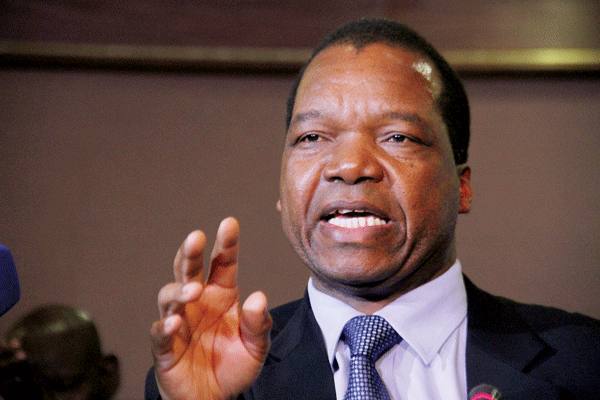
BY TATIRA ZWINOIRA
THE Confederation of Zimbabwe Industries (CZI) has urged the government to reconsider its stance to maintain a fixed exchange rate in light of the pressures caused by the 21-day lockdown to control the spread of the coronavirus.
Zimbabwe, like most of its neighbours, imposed the lockdown to stem the spread of the deadly disease that has paralysed the world economy and experts are predicting tough times ahead for local businesses.
In fresh proposals to government to lessen the impact of the lockdown seen by Standardbusiness, CZI said the fixed exchange rate of US$1 to $25 might prove counterproductive under the circumstances.
As part of measures to ensure business continuity, the Reserve Bank of Zimbabwe (RBZ) allowed for partial re-dollarisation by permitting businesses to trade using the United States dollar along the local currency.
CZI said although the move was encouraging for business, it did not go far enough.
“Businesses are very encouraged by the RBZ announcement to suspend the import and export penalty system and to remove the 30-day limit on holding export receipts,” the country’s largest industry representative body said.
“These are clear signals to the private sector of commitment and support.
- Chamisa under fire over US$120K donation
- Mavhunga puts DeMbare into Chibuku quarterfinals
- Pension funds bet on Cabora Bassa oilfields
- Councils defy govt fire tender directive
Keep Reading
“We also note that the government has introduced a fixed exchange rate regime on a temporary basis.
“We are obviously concerned about the sustainability of a fixed exchange rate in the absence of adequate reserves to support the fixed rate and confidence in the currency in general.”
CZI recommended a constant review of the exchange rate to reflect the market conditions during the lockdown.
Zimbabwe ended a decade of dollarisation mid last year, but the value of the local currency has been in free-fall due to hyperinflation.
CZI encouraged the government to consider its position on subsidies, saying some of the them, including those on fuel and gold production, were wasteful.
It said the convergence of the official exchange rate and that of the parallel market could be the only way out of the economic crisis.
“Eliminating subsidies and allowing the exchange rate to converge is the only way to boost production and optimise the use of scarce foreign exchange in this time of crisis,” reads part of the recommendations.
“With the magnitude of the crisis we are facing, we simply cannot afford wasteful subsidies “The government may also consider reducing the excise duty on fuel in view of declining oil prices on the international market.
“This can also act as a stimulus measure for the productive sector considering that when operations resume, they will face working capital challenges.”
Besides recommendations on the currency and subsidies, CZI also urged the banking sector to be sensitive in dealing with businesses that might fail to pay back loans during the crisis.
The body predicted that more businesses would fail to service their loans in the months after the lockdown.
“Rules on the recognition of non-performing loans may then trigger provisions in banks, which would undermine their capital bases.
“This is not only a Zimbabwean problem, but an international problem,” CZI added.
“We, therefore, recommend that the banking sector, together with the Public Accountants and Auditors board and the RBZ, come together and map out a strategy to manage this issue, in line with international best practice.”
CZI said proactive liquidity support arrangements must be put in place for the banking sector.
It urged the government to explore the use of guarantees to cobble up rescue packages for struggling firms.
“One option that could be considered is the use of guarantees to allow potentially viable companies to borrow and resuscitate operations,” the industry body said.
“Companies could pay a fee for these guarantees, which could then be used to fund any losses that the guarantee scheme may end up with.”
Property owners were also urged to show compassion in dealing with firms that would struggle to pay rentals as a result of their inability to trade during the lockdown.
“The courts can carefully look at any evictions to ensure that the landlord took due consideration of the factors beyond tenants’ control,” CZI said.
“The same logic that leads us to recommend landlords should treat tenants with compassion applies to banks and their treatment of mortgages and other secured loans.
“Rollovers and extensions of time should be encouraged, and the courts should carefully consider any foreclosures, to ensure that due consideration of the crisis can be demonstrated.”
CZI also proposed supportive tax measures to mitigate against the effects of the lockdown on businesses.
“All stakeholders, including employers and employees, are going to be severely compromised and affected by the crisis,” it said.
“To provide cushioning for employers and employees, we recommend that, effective 1 April 2020, Paye bands are increased by 200% to provide relief.
“We recommend that employers be allowed to offset any 2% tax paid in any given month against Paye due for that month.
“This will help to subsidise wages and allow employers to sustain the employees during the period of the lockdown.”
The International Monetary Fund last week warned that Zimbabwe’s economy was likely to take a battering from the coronavirus outbreak as it would make it harder to balance macroeconomic stability.











